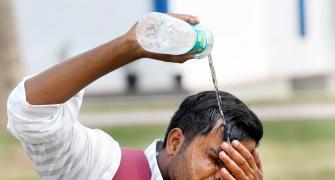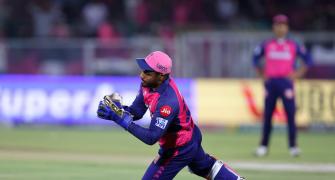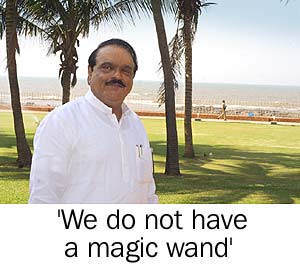
It's difficult to get a fix on the real Chhagan Bhujbal. Bhujbal the fiery orator? Bhujbal who is barely audible in one-to-one conversations? Bhujbal the grassroots leader? Bhujbal the powerful deputy chief minister? Bhujbal the loyalist? Bhujbal the opportunist? Bhujbal the rabble-rouser? Bhujbal the peacemaker? Or is he all of these, or none, depending on the situation?
Bhujbal adapts, accepts, assimilates. That is why he is still in circulation while some of his contemporaries in the Shiv Sena, where he started his political journey more than 34 years ago, have faded away.
Bhujbal loves a good fight. He split the Sena in 1991 and took a big chunk of its support base to the Congress, then led by Sharad Pawar in Maharashtra. Even in the best of times it's not easy to rebel against the brute power of Sena chief Bal Thackeray. In those days it was like signing one's own death warrant. But Bhujbal survived and became Pawar's confidant.
In June 1999, when Pawar left the Congress to form the Nationalist Congress Party, Bhujbal left with him to build a well-oiled organisation from scratch. There wasn't much time; the assembly election in Maharashtra was less than six months away. Yet, the NCP won 59 seats and cobbled together a coalition with the Congress, smaller parties and some independents.
But the biggest challenge of Bhujbal's political career yet awaits him. In the last 10 years, Maharashtra has plunged from being one of India's best governed states to one on the threshold of ruin. The state is facing an acute shortage of power. The farm sector is in a mess. The mood in the rival Shiv Sena-Bharatiya Janata Party camp is upbeat after the victory of Hindutva forces in Gujarat.
Is Bhujbal, the state's deputy chief minister and home minister, ready to face this challenge? We sent Deputy Managing Editor Rajeev Pai and News Editor Pankaj Upadhyaya to find out.
Everyone knows Maharashtra's economic condition. Yet, the state government has been growing in size. Yesterday [on January 29], Chief Minister Sushilkumar Shinde did announce a 50 per cent cut in salaries for all ministers. But when you are facing a deficit of Rs 80,000 crore, what difference is it going to make if you save Rs 75 lakh a month?
Look here, if the people of this state had elected a single party to power, I don't think the number would have gone above 40. But no one got a majority. And our [the Democratic Front coalition's] majority is also a slender one. So, we had to take all the other smaller parties together, like the Samajwadi Party, Janata Dal, Peasants and Workers Party, the independents. And in an alliance government, numbers are bound to increase. The same situation obtains everywhere in India today. [Uttar Pradesh Chief Minister] Mayawati faces the same situation, [Atal Bihari] Vajpayee faces the same situation.
Yes, I admit, there's the question of cost. But the way it is being portrayed is wrong. I've seen reports claiming that the cost is going to increase by Rs 2 crore because of the increase in number of ministers. This is all wrong. The cost of the entire council of ministers, projected for this year, was about Rs 9.5 crore. For so many ministers, mind you. So now for the additional ministers, how can the monthly expenditure be Rs 1.5 crore or 2 crore? You give any figures that come to your head, that's not right.
Yet, to reduce the expenditure that is going to be caused by the increase in the size of the government, we decided to cut not only our salaries, but all the allowances, like dearness, telephone, travel. And all the ministers have willingly agreed to this cut. We are happy that now more people can work at less cost for the state.
Have the compulsions of running a coalition government prevented you from paying enough attention to the task of governance?
At that time [when the government faced a rebellion from some MLAs last year], for 8 to 10 days, this was the situation. Because no one knew what was to happen. I even stopped seeing and clearing files. Most people thought that now this ministry is going! Though I remained in contact with police officers for day-to-day work, I avoided clearing any files.
Otherwise, we are working every day. There has been no impact on our work. Every government has to face these situations. The opposition is always doing something and you have to face it, carry out the administrative responsibilities.
But yes, for a few days people get distracted from their work by these events. It happens with us too. Officials also feel these people will go; their behaviour changes. When such instability is caused, what you say is correct, the common people suffer. But the opposition is responsible. It will not do if the opposition parties behave in an irresponsible manner.
When the Sharad Pawar-led Congress government demitted office in 1995, the state government had a surplus of Rs 250 crore. Now it's facing a deficit of over Rs 78,000 crore! How will you remedy this situation?
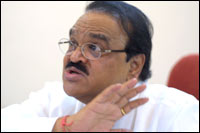 What you have said is true. The budget had a surplus. There was absolutely no problem. [But] the Shiv Sena-BJP government came in and ruined the state's financial discipline. For big projects, every government used to take loans either from the central government or, with its permission, from the World Bank. Why? Because the payment period is longer and the [rate of] interest is very low. That's why everybody goes after that.
What you have said is true. The budget had a surplus. There was absolutely no problem. [But] the Shiv Sena-BJP government came in and ruined the state's financial discipline. For big projects, every government used to take loans either from the central government or, with its permission, from the World Bank. Why? Because the payment period is longer and the [rate of] interest is very low. That's why everybody goes after that.
[But] the moment these people came to power, they were in a hurry to do something, rather to get something. But the funds were limited. So they went to the share market, issuing bonds and what-not. At that time, they did not bother about the central government. After some time, the central government stopped giving any funds to the state government. Several projects, several schemes, came to a halt. Take the water supply scheme. The central government asked for 10 per cent of the cost to be contributed by the local people, and 90 per cent by the government, to be shared by the Centre and the state. But these people said no, we want 100 per cent!
They went for the bonds, they started the works; all irrigation works they went on the same lines. The World Bank stopped giving them a single farthing. At one point of time, Maharashtra was the only state and after some time the number 1 state to get money from the World Bank. But during the Shiv Sena-BJP government's regime they scrapped our name. They stopped talking to the government. They gave loans to Andhra Pradesh, Karnataka, Uttar Pradesh, Rajasthan, but not Maharashtra.
So in this situation, the Sena-BJP government raised around Rs 50,000 crore. And what was the interest they were paying? World Bank offers loans at 6 per cent interest. Whereas for the loan raised by the Sena-BJP government the interest was 17 per cent! Just see the numbers now. At 17 per cent, my government is paying Rs 8,500 crore every year in interest, whereas if the same money had been raised from the World Bank, we would have paid just Rs 3,000 crore. So I am spending Rs 5,500 crore extra every year -- that's an amount that can take care of all the state's development expenditure!
And how does one pay this interest? We borrow more money. So, in the first three years, we paid around Rs 25,000 crore extra in just interest. Rs 50,000 crore + Rs 25,000 crore = Rs 75,000 crore -- that's your figure, that's the state's total debt. Now, the repayment will begin -- Rs 2,500 crore every year -- so the figure swells to Rs 11,000 crore a year.
Now, what are the options before the state government? We do not have a magic wand. And, to add to our woes, the state has been facing a drought. Where we were spending Rs 300 crore on the employment guarantee scheme, we are now having to spend Rs 900 crore. The central government did not pay us a farthing.
Number 2, this cotton monopoly scheme till 1995, there was no problem. What is the scheme? The corporation will purchase cotton from farmers and pay them the first instalment of the purchase price. The government will then sell the cotton in the open market and out of the profit made pay the farmers the second instalment. No profit, no loss. Even now the structure of the scheme remains the same. But what the Sena-BJP government did was, though the market price was Rs 1,600 [per quintal] they offered farmers Rs 2,100. Now the farmers ask us if the previous government could give them Rs 2,100 for a quintal of cotton when the market price was Rs 1,600, why can't you? This has become a political problem for us. And the total loss in the cotton monopoly scheme, from the time the Sena-BJP government took over to this day, has risen to more than Rs 3,500 crore.
It is this indiscipline started by the Sena-BJP government for which the whole state is suffering. Now, since we have paid more than the market price to the cotton growers, farmers growing onions want more money too. So do orange growers. We paid them. Sugarcane growers said all these years we have contributed on an average Rs 1,500 crore in terms of tax revenues; now we are in trouble, you must help us. Their grouse was also genuine. They suffered because the Union government imported sugar from Pakistan and Brazil, leading to a glut in the market. Naturally, there were no buyers for sugar produced in Maharashtra. Even now over 45 lakh tonnes of sugar is lying in godowns. The godown rent is increasing. The money [spent on buying the sugar stock] is locked. Now we are being asked why we have given counter-guarantees on loans taken by sugar factories. This is the reason. With the central government allowing import of sugar, the entire domestic market is in a mess. The counter-guarantees we have given are aimed at helping farmers; these are co-operative sugar factories.
So, one after the other we have faced these problems that were not the creation of this government.
Then, about revenue collection. Because it's a coalition government [decision-making has been a problem]. We say let's increase the excise duty, we will get some Rs 400 crore to Rs 500 crore, someone else says no. They want farmers to get more money when they sell milk to co-operatives, but they do not want the consumer to pay more. So, these are some problems.
What is the remedy? Yes, we are talking to the central government. We are talking to the World Bank. Not only have we sought fresh loans, we have requested the World Bank to reschedule the old ones. If all this works the way it is being planned, we will certainly save over Rs 5,000 crore every year without doing anything else. For drinking water projects we have sought to raise 10 per cent of the total costs through people's contribution and they are willing to pay.
We are introducing reforms in the generation and distribution of electricity. We are in touch with the central government, we have told them about the efforts we are making. The World Bank has agreed to initiate fresh talks. They have asked us to forward a letter through the central government, which we have done. Our letter has been lying with the central government for over two months now, I don't know for what reason [smiles]. I have spoken to Sharad Pawarsaab [NCP president] about this. Once we are able to renegotiate our debts, we will be able to move forward faster.
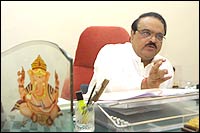 At the same time, we have told Chief Minister Sushilkumar Shinde that certain tough decisions will have to be taken. For anything we will do, there will be a reaction. The Opposition people, we do any damn thing, they will oppose it. But to improve our resource mobilisation, we will have to take some tough decisions and stick to them. It has happened in the last few years; we took a decision, the Opposition objected, and we rolled back. Tough decisions will have to be made. This is the only way to come out of this mess. All of a sudden we cannot tax people, collect money, and pay all our debts. We will have to take it step by step. You cannot wish away the problems faced by the farmers, poor slum-dwellers, milk co-operatives, schools... no, no... how can you? You have to pay the cops, you have to pay the teachers. Other expenditure you can curtail.
At the same time, we have told Chief Minister Sushilkumar Shinde that certain tough decisions will have to be taken. For anything we will do, there will be a reaction. The Opposition people, we do any damn thing, they will oppose it. But to improve our resource mobilisation, we will have to take some tough decisions and stick to them. It has happened in the last few years; we took a decision, the Opposition objected, and we rolled back. Tough decisions will have to be made. This is the only way to come out of this mess. All of a sudden we cannot tax people, collect money, and pay all our debts. We will have to take it step by step. You cannot wish away the problems faced by the farmers, poor slum-dwellers, milk co-operatives, schools... no, no... how can you? You have to pay the cops, you have to pay the teachers. Other expenditure you can curtail.
Apart from all this, we have more or less stopped fresh recruitment in the government. Every year 3 per cent of the state employees retire. We have decided to fill in only essential posts -- police, teachers, doctors and those that fall under the reserved categories. Others we will go slow on. So where we are required to hire 3 per cent of the total strength of the state employees, we are recruiting only one and a half. We have around 18 lakh people working in various government departments. That means we will shed around 27,000 employees every year.
One other thing that put a massive strain on the governments all across the country was the Fifth Pay Commission award. What can we do? If we cut government employees' salaries, they will all strike work. You can talk to people in other states, just see how they are suffering. Yes, we are suffering more because of the Rs 50,000 crore debt that we were saddled with when we took over. It hurts more because Maharashtra upto 1995 was in a very comfortable position.
You just spoke of approaching the World Bank for fresh loans and renegotiating old ones. But do you have enough time? The next election is less than two years away.
No, there are several others things we are doing. In the election too we will do well because we have helped everyone. We have helped cotton growers. We have helped orange growers. We have helped sugarcane growers. And they are the voters.
Will you be having an alliance...
Well, alliance...
Because you said Maharashtra suffered because voters did not elect a single party. If you had had a pre-poll alliance, it could easily have been a Congress-NCP government
Yes, I want an alliance. I had wanted one even for the municipal election in Mumbai. I openly canvassed for it... karo, karo, karo [do it, do it]. Unfortunately, the Congress did not agree. What happened? Again, Shiv Sena-BJP came into power. Now also I say we need a pre-poll alliance. In Nanded we were together, we won. Mira-Bhayander we were together, we won. There have been several municipal elections where an NCP-Congress alliance has been successful. But if we contest independent of each other, we are not going to win.
You see the Shiv Sena-BJP. They come together only for elections. Otherwise they are always fighting. See, Shiv Sena-BJP, ideology more or less same; fighting each other all the time; coming together at the time of election. Congress-NCP, ideology more or less same; fighting each other; but at the time of election we should also come together. If they can do it, why can't we? I am happy the Congress Working Committee looks inclined towards a pre-poll pact with the NCP. We have received some messages. Our response has been positive.
So you are clear that the NCP on its own does not stand a chance against the combined might of the Sena-BJP.
That we realised last time itself. That is why we were forced to seek the support of other smaller groups.
Is that why the criticism of Sonia Gandhi has been toned down?
It's not that. In a municipal election or a state election, it's not Sonia Gandhi who is going to become the mayor or chief minister. So, where is the question? And if we can come together and form a government to keep Sena-BJP away from power, we might as well fight the next election together.
Part II: 'There is only one Hindu hriday samrat'
Photographs: Jewella C Miranda; Design: Dominic Xavier

